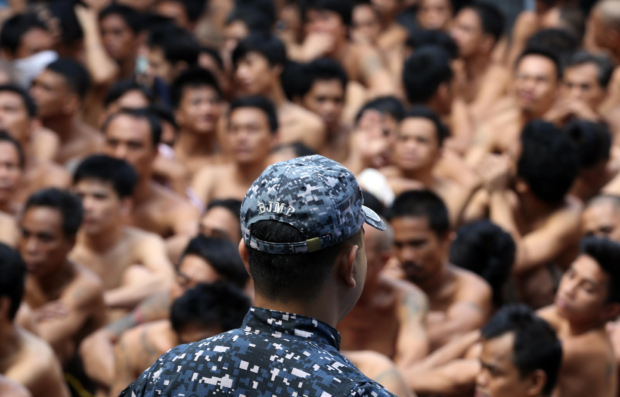
File photo of a jail facility in Quezon City under the supervision of the Bureau of Jail Management and Penology (BJMP). (File photo by NIÑO JESUS ORBETA / Philippine Daily Inquirer)
MANILA, Philippines — What exactly causes congestion in the country’s jails and prisons?
The answers may not be as simple or obvious as you think, hence the need for a National Jail Congestion Summit.
The Justice Sector Coordinating Council (JSCC) plans to conduct the summit in an effort to identify the root causes behind the prolonged detention of inmates.
The JSCC is composed of the Supreme Court, the Department of Justice, and the Department of the Interior and Local Government.
READ: Gov’t starts jail decongestion; new city jails chief named
READ: PCIJ audit finds PH prison system gaps: Congestion, kids in jail
According to Chief Justice Alexander Gesmundo, agencies in the justice sector will work on establishing new policies and initiatives to expedite the processing of criminal cases and alleviate jail congestion.
Gesmundo recently met with inmates — or persons deprived of liberty (PDLs) — at New Bilibid Prison in Muntinlupa City and at the Pasay City Jail in observance of the 28th National Correctional Consciousness Week this year.
He stressed the importance of conducting jail visits to be able to determine the actual conditions of PDLs and detention facilities. These will be the bases in formulating policies that shall enhance jail management and ensure the humane safekeeping of PDLs.
The chief justice also assured the PDLs that the Supreme Court had been spearheading many initiatives specifically meant to benefit PDLs, such as recommending lower bail amounts for indigent individuals facing trial and expediting the process for PDLs qualified for release.
Trial courts were also given the directive to prioritize the disposition of criminal cases to hasten the PDLs’ release.
Earlier, Gesmundo also assured PDLs that the Supreme Court would examine the “compassionate interpretation” of Republic Act No. 10592 — the law that grants good conduct time allowance for convicts.
He noted that the high court had invested in other projects and programs to promote a judiciary that is more efficient, modern, and accessible to the people.
“These include conducting online hearings, streamlining and expediting our systems and processes, and strengthening programs for free legal assistance,” Gesmundo said.

